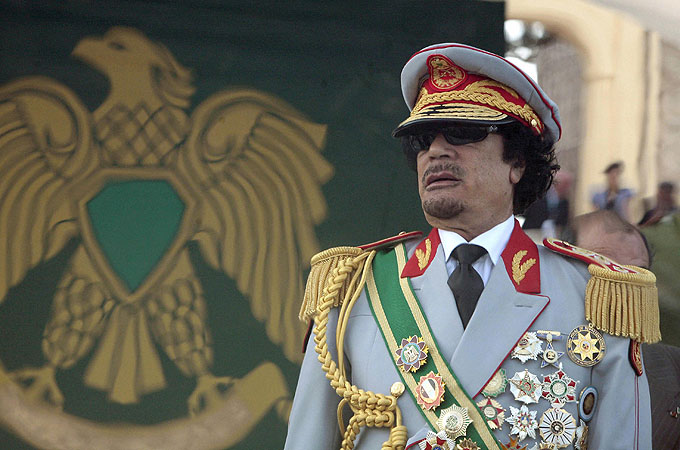Libya: The revolt that brought down Gaddafi
Rich with oil, Libyans may begin 2012 in a better position than other Arab revolutionaries.

 |
| The self-described ‘dean of Arab rulers’ met a violent death at the hands of his own people in 2011 [Reuters] |
After nine months of fighting, a NATO imposed no-fly zone and plenty of fiery speeches from the “King of Kings”, Libyan rebels killed Muammar Gaddafi in October, ending his 42-years of dictatorial rule.
A grassroots rebellion to some and an example of foreign meddling to others, the Libyan people are set to build a new future without the “Brother Leader” and his infamous Green Book.
Unlike rebellions in Tunisia and Egypt, Libya’s conflict looked more like a conventional war than a series of protests. After demonstrators were met with live ammunition from Gaddafi’s forces, rebels armed themselves and took control of Benghazi on February 20. Rebels used the eastern city as a base to launch attacks on Gaddafi strongholds in the rest of the country.
The rebellion began with poorly trained young men taking leave from office jobs to drive pick-up trucks, mounted with jerry-rigged heavy weapons. But with time, and foreign training, the rebels became a reasonably effective military force.
The National Transitional Council (NTC), the umbrella group for rebel fighters led by defectors from Gaddafi’s government, gained recognition in western and Arab capitals.
NATO, along with its Qatari partners, began bombing Libya on March 19, co-ordinating operations with fighters on the ground.
While France’s Nicolas Sarkozy and the UK’s David Cameron were warmly received by rebels, Gaddafi’s statements calling his opponents “rats” and “gangs of drugged cockroaches” begged tough questions for European leaders, who had embraced him only months before.
‘We will win’
Saif al-Islam Gaddafi, the most prominent son of the deposed leader who wrote his PhD thesis at the London School of Economics about the need for democratisation, was seen as a moderniser by the West. But during fighting, he promised Gaddafi that loyalists would resist for “six months, one year, two years… and we will win”. Saif was wrong, of course, and rebels announced the violent killing of his father on October 20.
The gruesome and public manner of Gaddafi’s death, without a formal trial, raised questions about the NTC and its ability to mete out justice, even as Mustafa Abdel Jalil, its interim leader, called for calm, urging rebels not to launch reprisal killings against Gaddafi supporters.
Gaddafi fancied himself as an anti-colonial leader, “the dean of Arab rulers” who could lead Africans and Muslims against western imperialism. But in the end, Libyans did not buy the brand of self-absorbed, Cold War nationalism he was selling.
The tasks for the NTC are daunting. Institutions are fragile in the country, where the cult of Gaddafi’s personality, mixed with tribal loyalties and patronage positions, have defined the political culture for four decades.
Unlike Egypt, where the military remains in control, Libya’s rebellion became a true revolution, where the old order was swept away; this “clean slate” offers unique challenges and opportunities.
With a small population and vast oil wealth, Libya begins 2012 in a stronger position than its debt-laden Arab neighbours.